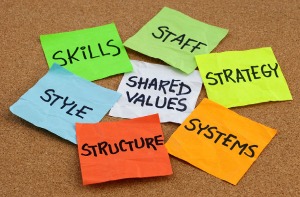Building Organisation Culture By Design
Fair and competent organisational practices in the following areas will define the culture of an organisation:
- Attracting and developing talent
- Creating a diverse and inclusive environment
- Fitting people to the jobs in line with their education, experience, behavioural inclinations, and their career goals
- Fitting people to the right teams
- Career path clarity
- Providing role clarity
- Leaders and managers acting as change owners and agents, respectively which is 𝙩𝙝𝙚 𝙢𝙤𝙨𝙩 𝙘𝙧𝙪𝙘𝙞𝙖𝙡 𝙤𝙧𝙜𝙖𝙣𝙞𝙨𝙖𝙩𝙞𝙤𝙣𝙖𝙡 𝙘𝙤𝙢𝙥𝙚𝙩𝙚𝙣𝙘𝙮
- Nurturing 'Organisation Is One Big Team' paradigm
- Empowerment
- Defining leadership and managerial DNA and aligning that with recruitment and promotion decisions
- Compensation
- Identifying and rewarding behaviours aligned with organisational goals
- Providing opportunities to learn through on-the-job projects before promotion assessments
- Role holders supporting each other in the process of continuous learning
The Prashna Approach
What is the need to build organisation culture by design?
It is important to build a culture where everyone feels comfortable in expressing ideas freely.
Organisation culture refers to how people act in an organisation and how they interact with each other. It is important to build a culture where everyone feels comfortable in expressing ideas freely. To create such a culture, leaders must model the behaviour they want to see in others and set the tone for everyday interactions. People also need to be actively involved in developing policies and procedures that support the culture. Your company should have a clear mission statement that spells out what needs to happen every day. The mission statement should inspire all employees to achieve goals that benefit the company and customers.

Today's business world has become highly competitive. Organisations must understand that they cannot simply rely on their internal processes alone to keep up with external pressures. Companies must adopt a new approach to management where they set goals for strategic performance instead of focusing only on short-term financial targets. Organisations must create a strong organisational culture that encourages continuous improvement to achieve these goals. This requires building a shared organisational identity that provides a common language, values, behaviours, and principles for all members of an organisation.
What are different types of organizational culture?
There are three main types of organizational culture: informal, formal, and performance cultures. These cultures differ from each other based on how people treat others, how they motivate their teams, and whether there is a clear hierarchy. A company's culture influences employee behaviour by influencing decision making, communication, motivation, collaboration, and job satisfaction. Companies that adopt formal cultures tend to be more structured, rigid, and less flexible. Performance cultures are usually high achieving environments where individuals thrive and work efficiently towards common goals. Informal cultures are more relaxed and easy-going and are conducive to learning new things and adapting to change.
Challenges associated with changing organizational culture
Cultural change is difficult for any organization because of how the human brain works; however, organizations that want to survive should change their culture to adapt to the new business environment. The first step towards cultural change is understanding the current culture and how it affects performance. Next, leaders must communicate to all team members what the new values are and why they are important. Finally, people must be trained to perform at the new level of achievement.
Organization culture and leadership
A leader can change the way an organization functions by influencing the way members to behave. Leaders influence others by helping them develop the right skills, showing how things should be done, and allowing them to succeed. If you're the first person in charge at your company, you'll need to set up a strong foundation from which other leaders can build upon. This means defining clear goals and expectations about what needs to be accomplished, setting a tone and style for the team, and getting everyone aligned around those goals.
Functional organizational culture
Functional organizational culture refers to how people think about work and what makes them feel good when they do something at work. On the other hand, organizational culture describes things like values, norms, traditions, beliefs, attitudes, behaviours, and practices. The two concepts are related, but each one has different implications for employee engagement.
A functional organizational culture is one where everyone has a job they love to do and feel fulfilled doing it. People who work at Amazon, Google, Facebook, Netflix, Apple, etc., all love what they are doing. They don't want to be somewhere else. This means that these organizations can attract motivated individuals who want to work for them. The annual talent acquisition budget of these organizations explains why they are successful.
